| Srl | Item |
| 1 |
ID:
150108
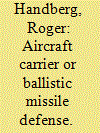

|
|
|
|
|
| Summary/Abstract |
Strategically, the United States is in a period characterized by uncertainty and diverse threats. Attempting to end two wars becomes background noise in the larger context of U.S. recalibration of its role in the world. U.S. power is perceived as either declining or being reoriented. Balancing off previous commitments with new ones becomes a critical and difficult task. The core problem becomes signaling commitment without deploying major forces to a particular location. Aircraft carriers are important symbolic instruments signaling U.S. interest regarding a particular issue. Those vessels are the linear descendants of battleships formerly the symbol of British power. Such deployments, however, are limited by being a ship, especially in disputes distant from the sea. Ballistic missile defense has come to occupy that role in signaling American commitment to allies or a state threatened by another. This can come as part of an alliance such as NATO's commitment of Patriot PAC-3 units to Turkey, with units drawn from three separate militaries including the United States.
|
|
|
|
|
|
|
|
|
|
|
|
|
|
|
|
| 2 |
ID:
075545


|
|
|
|
|
| Publication |
London, Routledge, 2007.
|
| Description |
202p.Hbk
|
| Standard Number |
9780415365826
|
|
|
|
|
|
|
|
|
|
|
|
Copies: C:1/I:0,R:0,Q:0
Circulation
| Accession# | Call# | Current Location | Status | Policy | Location |
| 052046 | 629.40951/HAN 052046 | Main | On Shelf | General | |
|
|
|
|
| 3 |
ID:
122297
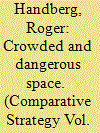

|
|
|
|
|
| Publication |
2013.
|
| Summary/Abstract |
U.S. success in conducting expeditionary operations globally has made GPS-equivalent capabilities essential for a modern military and also for a robust economy. As a result, other states are building independent satnav systems or in the Russia case replenishing and modernizing their GLONASS [Global Navigation Satellite System] system. One outcome is that future military operations involving multiple states may find other satnav systems being used in the regions. What consequences occur is the focus of this analysis.
|
|
|
|
|
|
|
|
|
|
|
|
|
|
|
|
| 4 |
ID:
072527
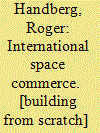

|
|
|
|
|
| Publication |
Gainesville, University Press of Florida, 2006.
|
| Description |
x, 284p.
|
| Standard Number |
813029848
|
|
|
|
|
|
|
|
|
|
|
|
Copies: C:1/I:0,R:0,Q:0
Circulation
| Accession# | Call# | Current Location | Status | Policy | Location |
| 051392 | 338.0919/HAN 051392 | Main | On Shelf | General | |
|
|
|
|
| 5 |
ID:
156944
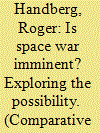

|
|
|
|
|
| Summary/Abstract |
A resurgence is occurring regarding the possibility of armed conflict in outer space. At a certain level, these new assertions regarding the possibilities of space war mirror similar arguments at the dawn of the space age. That enthusiasm for arming the heavens dissipated under the reality of conducting such operations proving extraordinarily difficult and expensive. Instead, the concept of a space sanctuary through international treaty and calculations of national interest became the norm. Recent actions and words by powers new to military space operations are generating a counterresponse by the United States. This study pursues the policy ramifications of changes in the understandings that characterize the current international space legal regime. Essential to understanding the new space order is the reality that the military space community now contains more members than the original two, the U.S. and the Soviet Union. The situation becomes a multisided game with profound implications in terms of budget, military organization and strategy, and politics. All this occurs in a situation of increasing international participation in space operations nominally commercial in nature. Commercial space applications hold the promise of allowing states to “skip” the developmental process by providing shortcuts not available previously.
|
|
|
|
|
|
|
|
|
|
|
|
|
|
|
|
| 6 |
ID:
052096
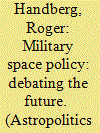

|
|
|
| 7 |
ID:
047504


|
|
|
|
|
| Publication |
London, Praeger, 2000.
|
| Description |
xi, 286p.
|
| Standard Number |
0275962954
|
|
|
|
|
|
|
|
|
|
|
|
Copies: C:1/I:0,R:0,Q:0
Circulation
| Accession# | Call# | Current Location | Status | Policy | Location |
| 043406 | 358.80973/HAN 043406 | Main | On Shelf | General | |
|
|
|
|
| 8 |
ID:
170454
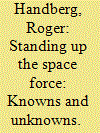

|
|
|
|
|
| Summary/Abstract |
Creation of a Space Force became possible when President Trump announced his decision to support such an organization. This followed on earlier congressional efforts to create a Space Corps, one that failed. Presently, the U.S. is working on the organizational possibilities ranging from a unified command, an independent sixth military service, or some other variant. The larger question is how such a force changes international understandings regarding military space operations. Such an effort draws a response from other space powers, exactly what that entails remains unclear. This effort raises the prospects for weaponization of outer space, creating a situation of strategic instability, given the vulnerability of space craft to interception and attacks both kinetic and electronic. Long term, the struggle is over whether space weaponization will totally undermine existing prohibitions on weapons of mass destruction, specifically nuclear. The prospects are heightened for an arms race in space including nuclear weapons.
|
|
|
|
|
|
|
|
|
|
|
|
|
|
|
|
| 9 |
ID:
137938
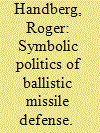

|
|
|
|
|
| Summary/Abstract |
Ballistic missile defense (BMD) politics present an interesting evolution in how the USA, especially Congress, has come to think about BMD both as operational reality and as a symbolic policy. The argument here is that BMD’s operational reality is increasingly overshadowed by its symbolic aspects. Such a status arose from rapidly changing international and domestic politics. The end result is a situation in which BMD policy in a sense floats above the question of its actual combat effectiveness. Its primary mission in part is sustaining US capacity to remain a global power and support its allies.
|
|
|
|
|
|
|
|
|
|
|
|
|
|
|
|
| 10 |
ID:
161004
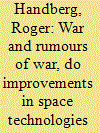

|
|
|
|
|
| Summary/Abstract |
Combat in near-Earth orbit is emerging as a more realistic possibility. The argument here is that changes in space technologies combined with a sea change in political rhetoric is bringing the possibility of military conflict in space technologies. This movement reflects a generational shift as the original decisions regarding military conflict in space are now being reassessed by a generation who did not experience World War II or the Cold War. For these, the sanctuary approach to space activities is not as persuasive and new enhanced space technologies bring the possibility of victory or at least survival possible during a conflict in space.
|
|
|
|
|
|
|
|
|
|
|
|
|
|
|
|